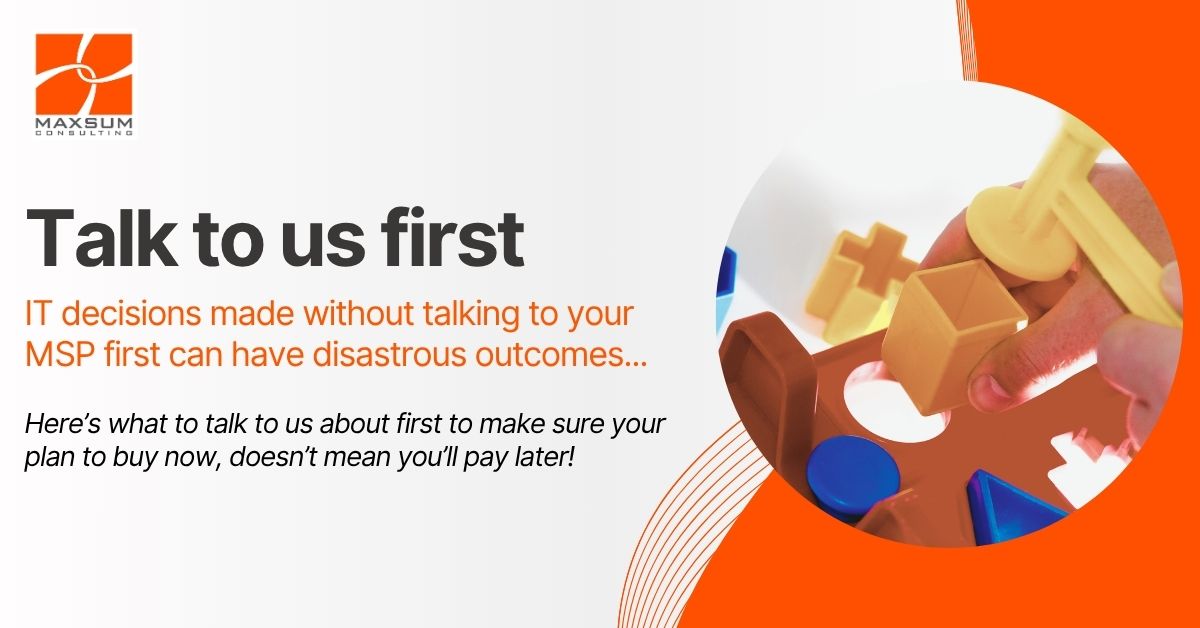Making IT decisions without talking to your MSP first can have disastrous consequences. Here’s why it always pays to ask first before you choose to buy now!
Businesses are constantly exploring new technologies to stay competitive, improve productivity, realise efficiency gains, and enhance customer experience. Whether it’s adopting a new software platform, upgrading hardware, or integrating cloud services, the temptation to move quickly can be strong. But before you hit “purchase”, sign that contract or tick to accept those t&cs, there’s one crucial step you should never skip: talking to your Managed IT Services Provider (MSP).
Your MSP Is More Than Just a Service Desk
Unfortunately (and despite our best efforts!) some organisations still view their MSP as a reactive resource—someone to call when something breaks. But if you’ve aligned yourself with a proactive MSP that offers more than just good tech support, your MSP will be ready and waiting to help you make strategic and operational decisions around your technology, manage risk and even help you to manage technology change.
Your MSP will have invested time in understanding your broader infrastructure, your business goals, and the nuances of your operations. Even if the technology you’re considering isn’t something they directly provide or support, they can and will offer invaluable insights that help you make smarter decisions.
Here’s Why Asking Your MSP First Matters
1. Compatibility and Integration
Your MSP knows your existing systems inside and out. They can assess whether a new tool or service will integrate smoothly or cause conflicts. This can save you from costly implementation issues or performance bottlenecks down the line.
2. Security Considerations
Security is a top priority for any business. Your MSP can evaluate the security posture of new technologies and ensure they align with your company’s compliance requirements and cybersecurity strategy.
3. Scalability and Future-Proofing
What works today might not work tomorrow. MSPs can help you choose solutions that scale with your business and avoid technologies that may become obsolete or difficult to support.
4. Cost Efficiency
Sometimes, what looks like a good deal on paper can lead to hidden costs—licensing fees, support charges, or the need for additional infrastructure. Your MSP can help you understand the total cost of ownership and identify more cost-effective alternatives.
5. Vendor Vetting
MSPs often have experience with a wide range of vendors and products. They can provide honest feedback, share lessons learned from other clients, and help you avoid unreliable providers.
6. Strategic Alignment
Technology decisions should support your broader business strategy. Your MSP can help ensure that your choices align with long-term goals, whether that’s digital transformation, remote work enablement, or operational efficiency.
A Real-World Example
Imagine your marketing team wants to adopt a new analytics platform. It promises powerful insights and a sleek interface. But after implementation, it turns out the platform doesn’t integrate with your CRM, requires a separate data warehouse, and introduces security vulnerabilities. A quick consultation with your MSP could have flagged these issues early — saving time, money, and frustration.
This is just one example of countless Disastrous Decisions that could have been avoided by having a quick chat with your MSP first.
The Bottom Line
Even if your MSP doesn’t sell or support the technology you’re considering, they are still your best first call. Their expertise, objectivity, and deep understanding of your environment make them an essential part of any tech decision-making process.
Before you leap into the next big thing, take a moment to talk to your MSP. It’s a small step that can make a big difference. Why not get started right now?



